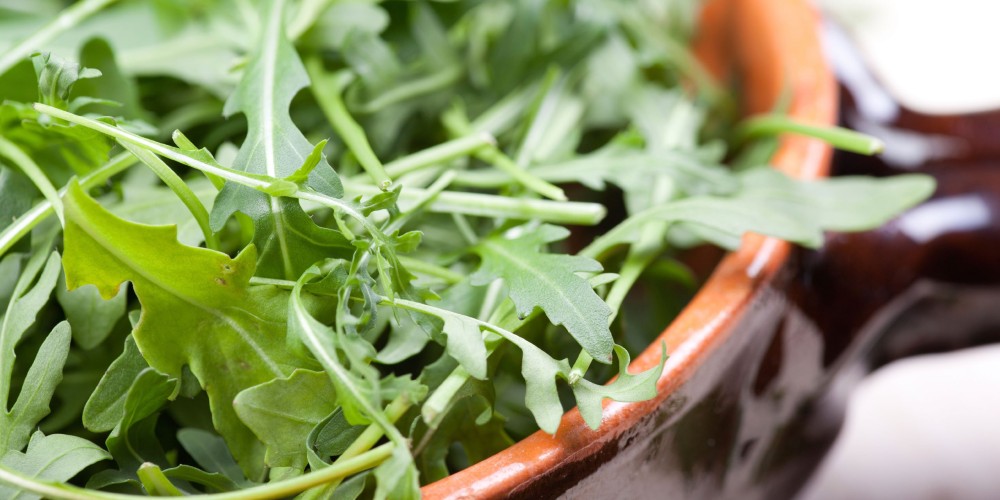17 May The Role of the Spleen in Traditional Chinese Medicine
The Role of the Spleen in Traditional Chinese Medicine
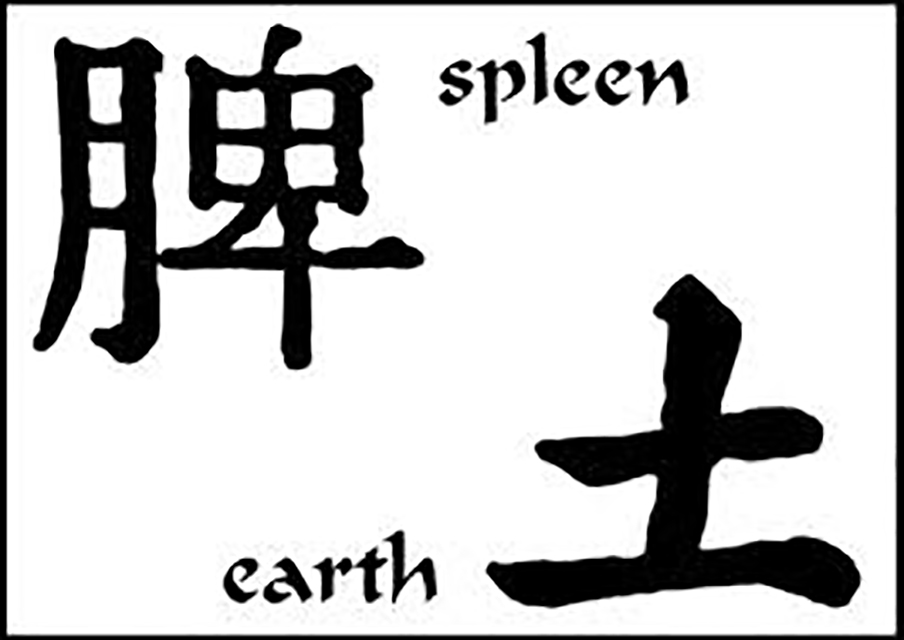 In week 73, we are sharing information from authorities in the field of Chinese medicine. We will be talking about a very important organ that rules so much of our health, weight, Lymph fluids so much of our wellbeing is connected to our emotions, and in these particular times, the spleen is in so much stress.
In week 73, we are sharing information from authorities in the field of Chinese medicine. We will be talking about a very important organ that rules so much of our health, weight, Lymph fluids so much of our wellbeing is connected to our emotions, and in these particular times, the spleen is in so much stress.
Enjoy share, and like if you do.
The Spleen dominates digestion and helps with bowel movements
The spleen is responsible for the transportation of the food and the water we digest. If the Spleen is weak or dysfunction occurs, it will affect certain areas of the digestive system including the Stomach, Small Intestines, and Large Intestines. This can cause the following symptoms: bloating especially after eating or drinking, constipation, sluggish bowel movements, diarrhea, irritable bowel syndrome, fatty or sticky stools.
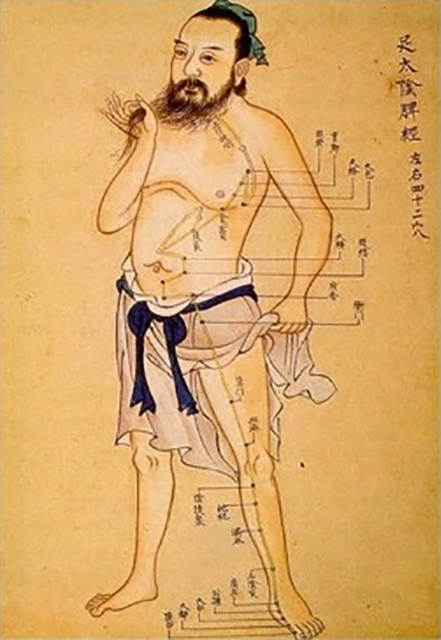
The Spleen dominates water metabolism and assists with weight loss
The spleen helps to transport fluids throughout our bodies and assists with excreting excessive fluids.
If Spleen is weaker or in disorder, our body will retain more fluids and the following symptoms can occur: Oedema, especially on the arms, legs and abdominal area and puffy face. Gaining weight easily or difficulty in losing weight. cellulite, sagging, Feeling of heaviness in the body.
The Spleen dominates certain circulation issues and assists with the quality and circulation of the blood
It is common to see many people with circulation issues resulting from Spleen Qi and Spleen Yang Deficiency. This affects the quality of the blood, and lack of circulation. The following symptoms may occur Iron deficiency, low blood pressure, scanty periods, pale face, lips issues, cold hands and feet, lack of energy, pale nail beds, craving sweets.
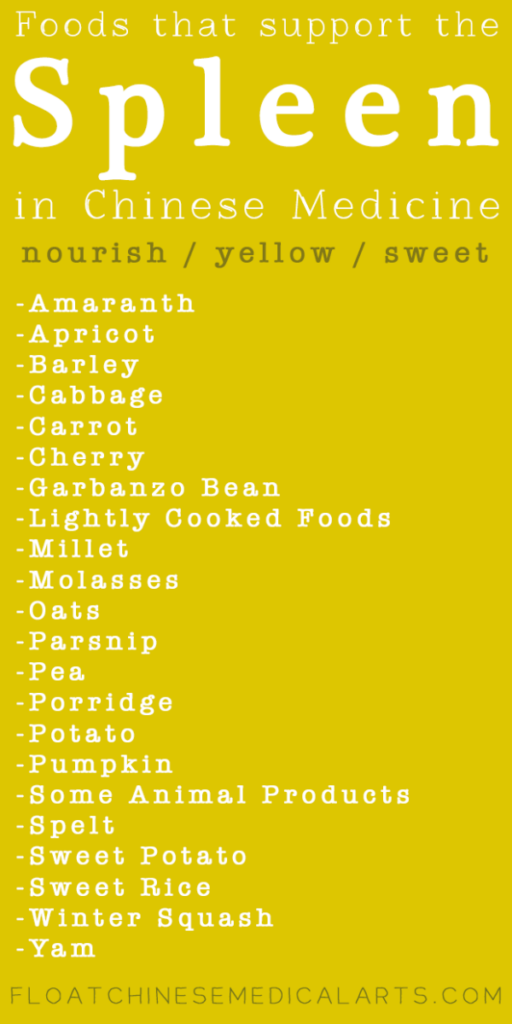 What diet or lifestyle choices assist with Spleen’s function? What should you avoid to protect your Spleen?
What diet or lifestyle choices assist with Spleen’s function? What should you avoid to protect your Spleen?
Food and drinks: the Spleen doesn’t like “cold”
Cold temperature food or drinks affect Spleen function. Avoid consuming large amounts of cold fluids or fruit, and salads, especially in the Winter months – this overloads the Spleen which causes bloating and sluggish bowel movements. We encourage clients to drink warm foods and drinks especially in the winter months or cold days. Examples of warming drinks include ginger tea or puer tea (Chinese tea).
Environmental factors: the Spleen doesn’t like cold and dampness
Coldness and dampness affect the Spleen function (affects Spleen Yang and Qi), certain symptoms we have discussed can be helped by choosing suitable environments for living in– ie sunshine, warm and dry conditions. Ensure you make time each day to exercise in the sunshine, avoiding exercise in the rain or damp conditions and in water (swimming may not be suitable).
The Spleen doesn’t like over-thinking
When we mentally over-think this will damage the Spleen Qi. Spleen Qi will slow down and this affects our bodies by feeling tiredness, bloating, heaviness. I recommend regular breaks from sitting at a desk and concentrating to encourage physical movement (ie 10-15 minutes every 1-2 hours). Acupuncture is a great source to restore spleen Qi.
 To induce weight loss, Chinese medicine aims for a balanced Spleen and Stomach. By strengthening the Spleen and Stomach, the body is able to break down and extract nutrients while sending the waste products to the intestines for proper elimination. The speed of metabolism is increased, allowing the body to process and utilize nutrients with greater efficiency while providing energy and vitality. Water transformation is made more efficient; helping the body rid excessive water and harmful toxic accumulations, whilst the regulation of bowel movements creates a balance of consumption against elimination.
To induce weight loss, Chinese medicine aims for a balanced Spleen and Stomach. By strengthening the Spleen and Stomach, the body is able to break down and extract nutrients while sending the waste products to the intestines for proper elimination. The speed of metabolism is increased, allowing the body to process and utilize nutrients with greater efficiency while providing energy and vitality. Water transformation is made more efficient; helping the body rid excessive water and harmful toxic accumulations, whilst the regulation of bowel movements creates a balance of consumption against elimination.
Eating a balanced diet in accordance with the principles of Chinese medicine will rebalance the Spleen and Stomach naturally. There are three general groups of foods within Chinese medicine; carbohydrates, proteins and fruits, and vegetables. Each group has a specific nutritional value and energetic activity. Generally, carbohydrates are sweet and warm, strengthen the Spleen and build Qi (energy). Proteins nourish Qi, Blood, Yin (Water) and Jing (Essence) and tend to be warmer than carbohydrates. Fruits and vegetables tend to be cooling, clearing and mobilizing in nature, thus providing a balance to the other groups. By varying the proportions, a holistic balance can be achieved, leading to greater water and fat metabolism.
Salads and Juices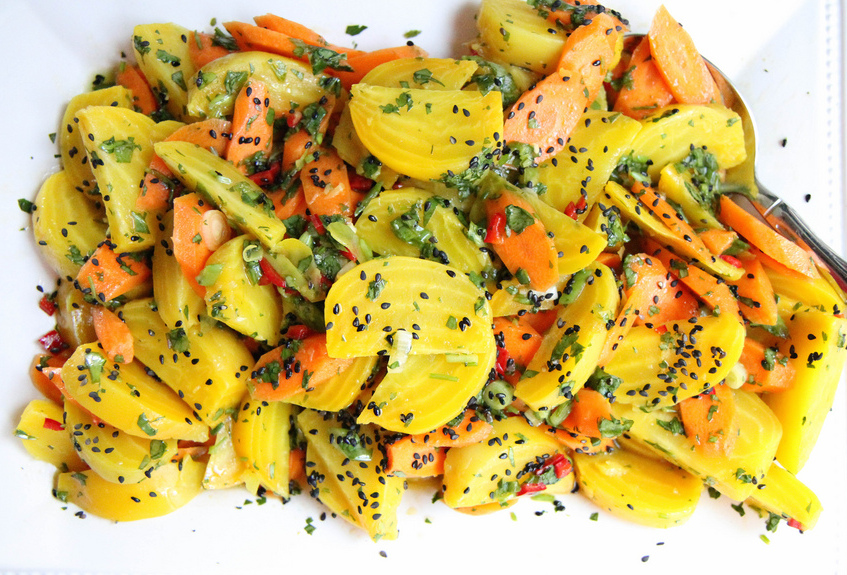
In the developed world, a balanced diet has been associated with the European Naturopathic movement’s beliefs in a diet high in raw foods, such as salads and juices. According to Chinese Medicine, too much raw food weakens the Spleen, eventually leading to weight gain. Eating foods that are already at body temperature or higher protects the Spleen and Stomach Qi. Digestive enzymes (Spleen and Stomach Qi) only work at physiological temperatures. The act of cooking actually contributes to the breakdown of foodstuff, thus aiding digestion. This does not mean that all raw food is bad. In hot weather, some raw foods are good at cooling the body down.
The ideal source of raw
Arugula
Watercress
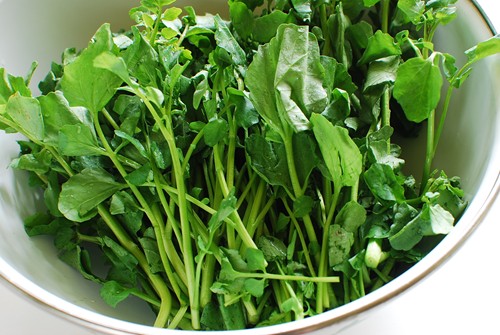 Spinach
Spinach

Baby spinach
Quality of Ingredients
All produce should be of the best quality available. Food should appeal to the senses, being vibrant in color and aroma, bursting with vitality and Qi. It is important to buy fresh produce frequently, from locally grown areas in the correct season.
Timing of Eating
The Spleen and Stomach have their own internal cycle and prepare to receive food at specific times of the day. If food is not consumed at these intervals, internal disruption results, causing weight gain. Generally, carbohydrate-rich meals should be consumed early in the day between 7 am and 11 am. Smaller meals are recommended towards the end of the day as the body slows down, preparing for sleep. It is not advised to eat anything after 9 pm.
Eating in a Relaxed State
Energy-intensive activities, such as working breakfasts, working through lunch and eating on the run, have a significant negative impact on the function and efficiency of the Spleen, resulting in weight gain.
Overeating – Under Eating
In the developed world we tend to eat too much or too little. Both these imbalances damage the Spleen. It is important to stop eating when you feel you could eat a little bit more, whilst skipping meals or restricting calorie intake can damage the Spleen, leading to weight gain once this practice is stopped.
Acupuncture
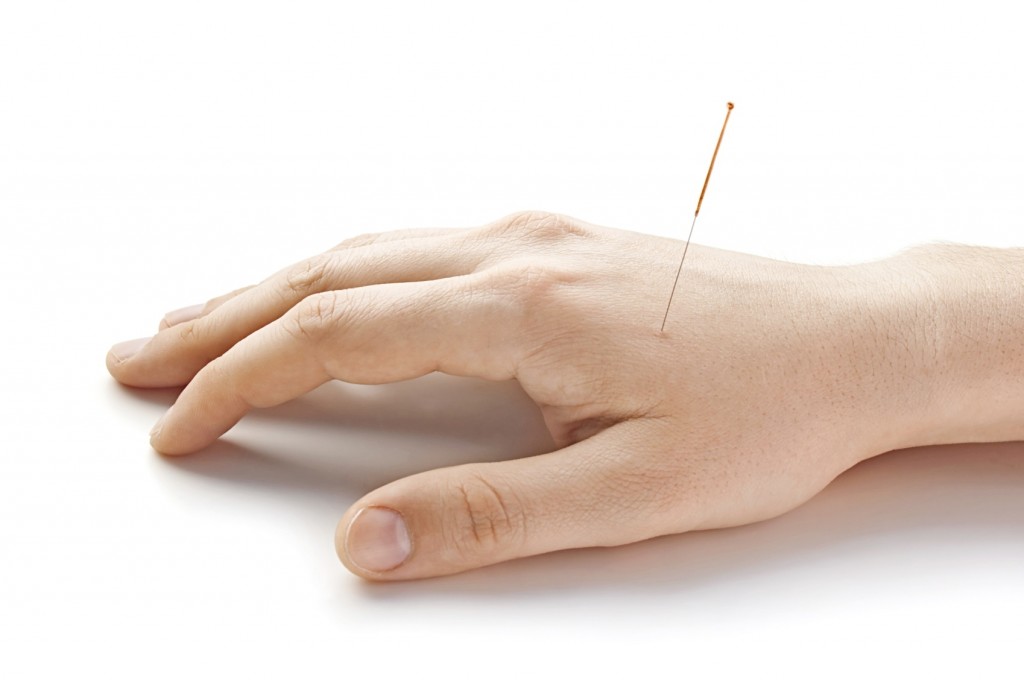 More recently, acupuncture has been used to aid weight loss by strengthening the Spleen and Stomach, regulating the endocrine function, reducing appetite, increasing defecation and increasing overall energy and vitality. Following acupuncture, the concentrations of blood sodium and aldosterone decrease whilst the concentration of blood potassium increases, thus improving water and salt metabolism. Further studies have also shown that acupuncture reduces the sense of hunger and slows down absorption in the small intestine whilst inhibiting the hyperactive digestion of the stomach.
More recently, acupuncture has been used to aid weight loss by strengthening the Spleen and Stomach, regulating the endocrine function, reducing appetite, increasing defecation and increasing overall energy and vitality. Following acupuncture, the concentrations of blood sodium and aldosterone decrease whilst the concentration of blood potassium increases, thus improving water and salt metabolism. Further studies have also shown that acupuncture reduces the sense of hunger and slows down absorption in the small intestine whilst inhibiting the hyperactive digestion of the stomach.

